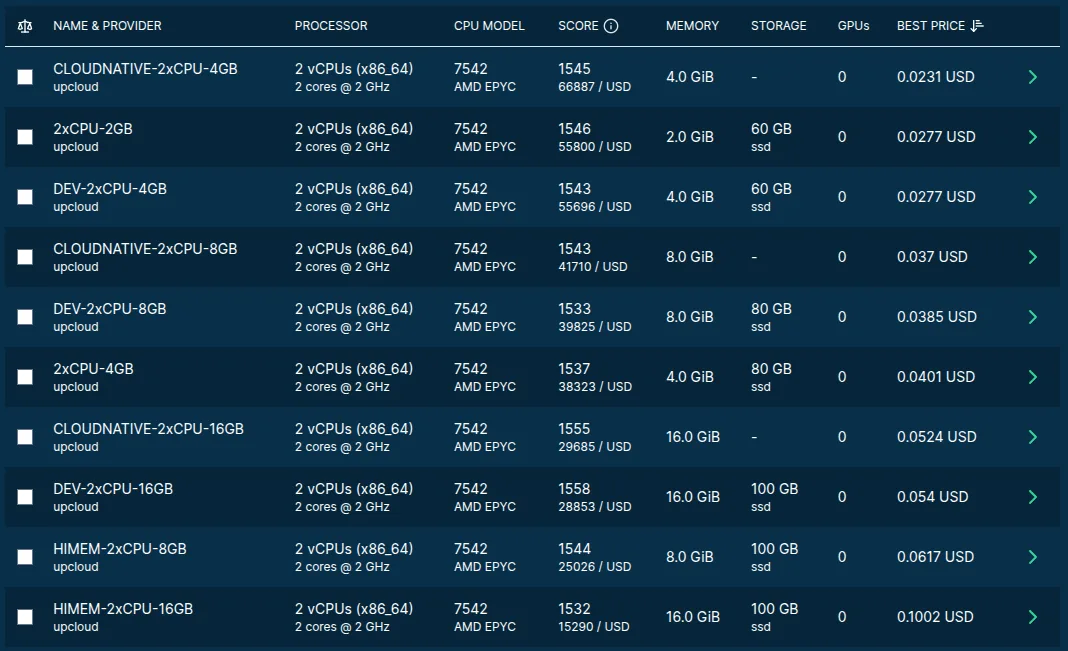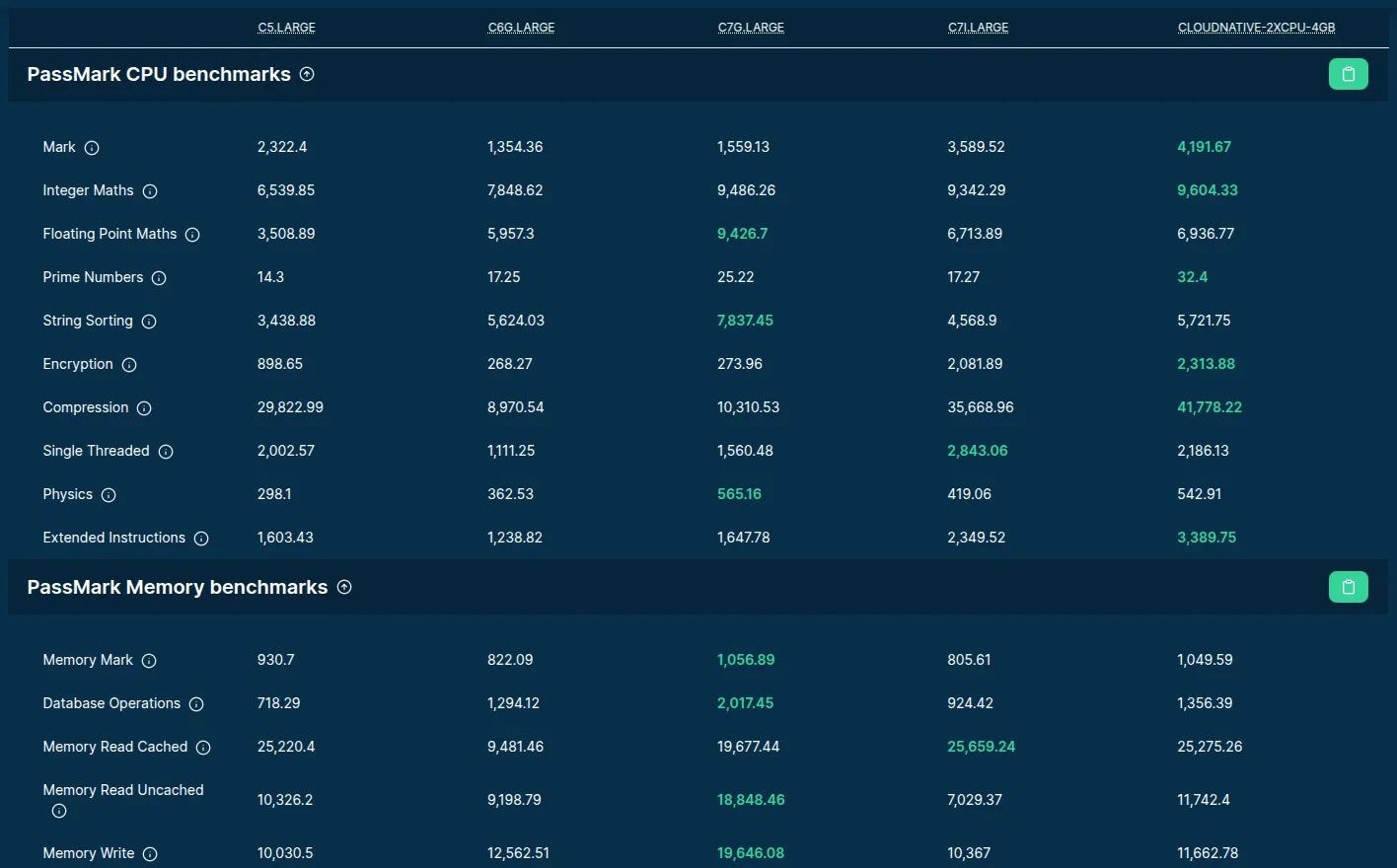We are thrilled to announce that UpCloud has recently been integrated into the Spare Cores ecosystem — joining other major cloud providers like AWS, GCP, Azure, and Hetzner, and all the UpCloud predefined server types are now available in our public cloud server listings with detailed hardware specs and performance data!
Integration Details #
The integration was a collaborative effort between the Spare Cores and UpCloud teams, and we highly appreciate their support! Here's what happened if you are interested in the actual implementation details:
- SKUs Listing: We integrated UpCloud's API into our Crawler to enable it to query the list of predefined server types and their high-level specifications from UpCloud. Utilizing UpCloud's Python SDK for their API was straightforward.
- Data Pipeline: The Crawler runs on an hourly basis in our Data repository to look for new, updated, or deprecated server types at all supported vendors.
- Pulumi Templates: We developed UpCloud-specific Pulumi templates in our Runner component to facilitate server creation and deletion, including related cloud resources. As UpCloud already had a Pulumi provider in Python, this process was quite straightforward.
- Account Creation: UpCloud generously provided us with ample cloud credits and extended our quotas, allowing us to start all their server types for benchmarking, even in parallel, including their largest public node type with 80 vCPUs and 512 GiB of RAM 😻.
- Benchmarking: The Inspector continuously scans our database for servers with missing performance data and runs the necessary benchmarks as needed.
- Results: The results are automatically published in our SQLite database files, public APIs, and webpage.
Server Families #
UpCloud currently offers five server families in three major categories:
- Developer: Ideal for smaller projects (99.99% SLA) with complimentary network traffic and an IPv4 address.
- General Purpose: General Purpose, High CPU and High Memory configurations with higher (100%) SLA, network and IPv4 address included, better storage performance.
- Cloud Native: Highest compute performance and high (100%) SLA, flexible storage, network traffic included, but IPv4 comes at an extra cost. Ideal for containerized workloads.
We were interested in the actual performance difference of these configuration options, so first we compared all their server types in the 2 vCPU segment, where both the Developer and Cloud Native families are available.
2 vCPU UpCloud Servers #
There are 10 options with 2 vCPUs, ranging from 2 GiB to 16 GiB RAM:

Image source: Spare Cores server listing.
All these server options come with the same CPU model (AMD EPYC 7542), resulting
in similar SCore ("Spare Cores Score") values. The SCore represents the number
of div16 operations using the stress-ng CPU stress testing tool, which we
use as a proxy for raw CPU performance. For more details, check out our
Performance metrics blog post.
In less synthetic benchmarks, we also observe very similar performance, with slight differences due to varying memory configurations. For example, in the multi-core Geekbench benchmarks:
The lower scores belong to the 4 GiB RAM configurations.
Larger node types at UpCloud #
When examining higher-scale models, the Developer plan is no longer available, but other CPU models are accessible. For instance, in the 16 vCPU configurations, both the AMD EPYC 7542 and 7543 are available. Although the newer generation CPU has the same CPU flags/features, it operates at a higher base clock speed and can achieve higher boost frequencies, translating to better performance, even in memory bandwidth benchmarks:
Scaling up to the largest nodes grants access to the AMD EPYC 9354 Zen 4 gen CPU, which significantly boosts performance due to a higher base clock speed, larger CPU caches, and more powerful CPU instructions, such as AVX-512. A good example might be compression workloads:
Note that Spare Cores reports on all available CPU flags and features of all monitored servers, so if you have specific needs for a task, we can help you find the right server type for your use case.
Competitors #
How does UpCloud compare to other cloud providers? We have updated our comparison lists of the best multi-core and single-core performance servers on our main Server Comparison page with the UpCloud offerings.
In general, when considering the older generation Zen CPUs, the SCore values are not the strongest in the competition. However, the Cloud Native plans offer a very good performance/price ratio, especially in PassMark workloads, such as encryption or compression, or some memory read operations. As a quick example, here's a comparison of UpCloud's 4-vCPU Cloud Native plan with four generations of 4-vCPU AWS servers with mixed Intel and ARM CPUs:

Data source: Spare Cores comparison.
When evaluating the price, it's also useful to note that UpCloud's pricing includes generous outgoing (egress) traffic, which is not the case with most other providers. An IPv4 address is also included in the price for most UpCloud plans, for which all other providers charge an extra fee ranging from 0.5 to 4 USD/month.
If you need custom configurations, UpCloud supports any combination of vCPUs and memory amounts with flexible storage, so you are not limited to the predefined server types mentioned above. This can be a great benefit for those who need to run specific workloads.
Final Thoughts #
First of all, we are grateful to UpCloud for their support and for making their servers available for benchmarking! This is a great addition to our ecosystem, and we look forward to seeing more cloud providers join us.
If you missed something in this post or have any questions, please let us know in the comments below!
